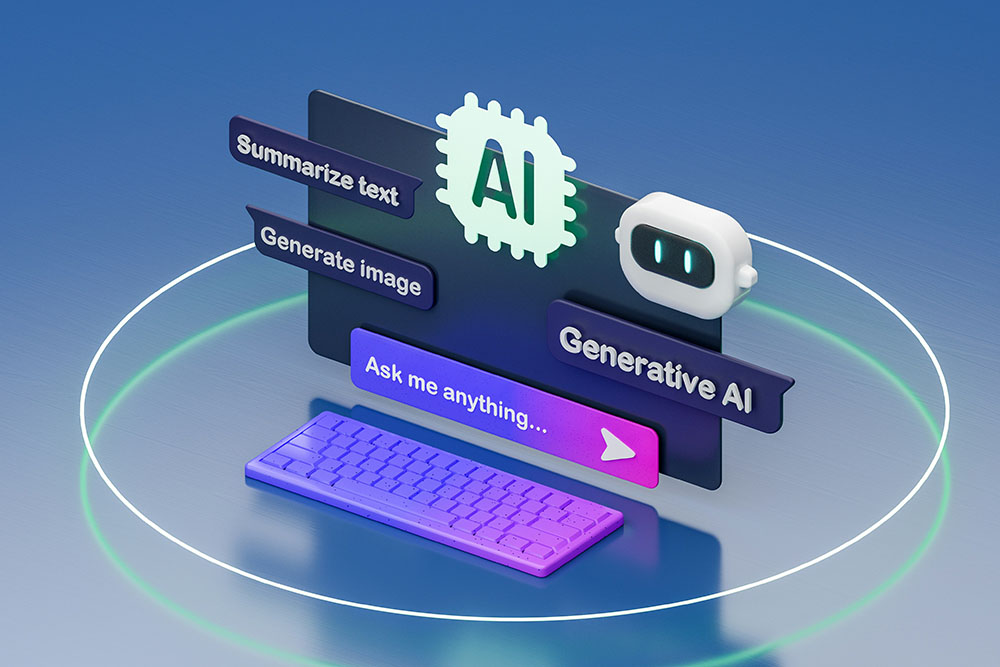The arrival of China’s new artificial intelligence (AI) chatbot, DeepSeek, has brought AI back into the spotlight in early 2025. This industry report provides an updated overview of the global market landscape and the main trends that brought us here. Readers can also find an outline of key players, rising stars, opportunities and risks for investors to consider in the months ahead as they build their portfolios.
Market Overview: AI
Artificial intelligence (AI) has grown significantly over the past five years. In 2020, the global market stood at $93bn. Two years later, it reached $124bn. Today, in 2025, the AI market has reached $243bn, with the figure in 2030 forecasted at $826bn. Between 2025 and 2030, the compound annual growth rate (CAGR) is placed at 27.67%.
AI can be divided into multiple segments. Industry is a key lens to examine the market, with AI having multiple uses across verticals, including law (e.g. to assist with legal compliance), retail (for sales and marketing), and transport/automotive (design and development). AI can also be categorised by technology, such as machine learning, deep learning, and natural language processing (NLP).
A third segment is application, with AI used to provide solutions such as disease diagnosis (e.g. cancer), cybersecurity, and human resources (employee management and recruitment). The fourth lens, of course, is geography. North America took 31% of AI revenue share in 2023. Still, Europe is also poised for significant growth between now and 2030 – particularly in financial services, where AI is being integrated to improve efficiency.
Key Features & Market Trends
The world of AI has already travelled a long way since ChatGPT exploded onto markets in early 2023. Later that year, Google launched its Gemini large language model (LLM) to rival Microsoft in its partnership with OpenAI. Since then, almost every sector has witnessed firms bringing AI into their operations and business models to varying degrees.
One primary benefit offered by modern AI solutions is easy access to historical datasets. For instance, scientists can discover academic resources more readily. Computing architects and web developers can accelerate their coding efforts. Data abundance empowers AI models to learn and improve continuously, offering firms greater power to streamline processes and lower operational costs in various industries.
One interesting area is the development of facial recognition technology using AI. Government authorities have long used video surveillance – e.g. at ports of entry to ensure travellers match their passports. Advancements in AI stand to improve our ability to identify criminals. However, facial recognition could also highlight the potential perils of AI. For instance, is it possible that certain demographics may be at higher risk of misidentification? What about data privacy risks?
Key Players & New Entrants
The most prominent AI companies are no surprise: Apple (AAPL), Microsoft (MSFT), Nvidia (NVDA), Alphabet (GOOG), and Meta Platforms (META). However, the landscape is still in a highly disruptive stage. The arrival of DeepSeek in China is a case in point. Although it is still a privately-held company, DeepSeek’s arrival sparked considerable panic amongst investors in late January. In particular, Nvidia lost $600bn in market capitalisation in a single day.
However, the disruptive nature of the AI market could be good news for early-stage investors. There is still considerable space for startups to make their mark. The UK has its fair share of AI innovators to speak of. Wayve uses AI to analyse roads for its self-driving vehicles. Founded in 2017 at the University of Cambridge, Wayve has received $1.3bn over three funding rounds. A second case study is Benevolent AI, which focuses on drug discovery using AI-generated insights and predictions.
Risks & Opportunities
At present, regulatory and ethical concerns are among the biggest constraints on the AI market. Governments are tightening AI regulations over fears about privacy, bias, and misuse. Stricter data privacy laws (GDPR, AI Act) may impact AI business models.
There are also risks of overvaluation. The DeepSeek event in January led many investors to ponder the high current price-to-earnings ratios of many US tech stocks. Bubbles and crashes are possible, and investors should be wary of speculative AI startups.
However, AI has enormous potential for investors if they conduct proper due diligence. The AI industry is projected to grow exponentially, and AI adoption is increasing across sectors like healthcare, finance, retail, and manufacturing.
AI needs high-performance computing chips, lending support to other key industries such as semiconductors and computer hardware. AI firms can offer diverse investment avenues and opportunities to participate in disruptive innovation.
Whilst governments are seeking to mitigate data and security risks from AI, they are also pouring billions into AI research and development. Tech giants are also actively acquiring AI startups and integrating AI into their operations.
If you are interested in expanding your portfolio into these kinds of exciting spheres of investing, then we invite you to get in touch with us here at Bure Valley and consider joining our exclusive investor network:
+44 160 334 0827


